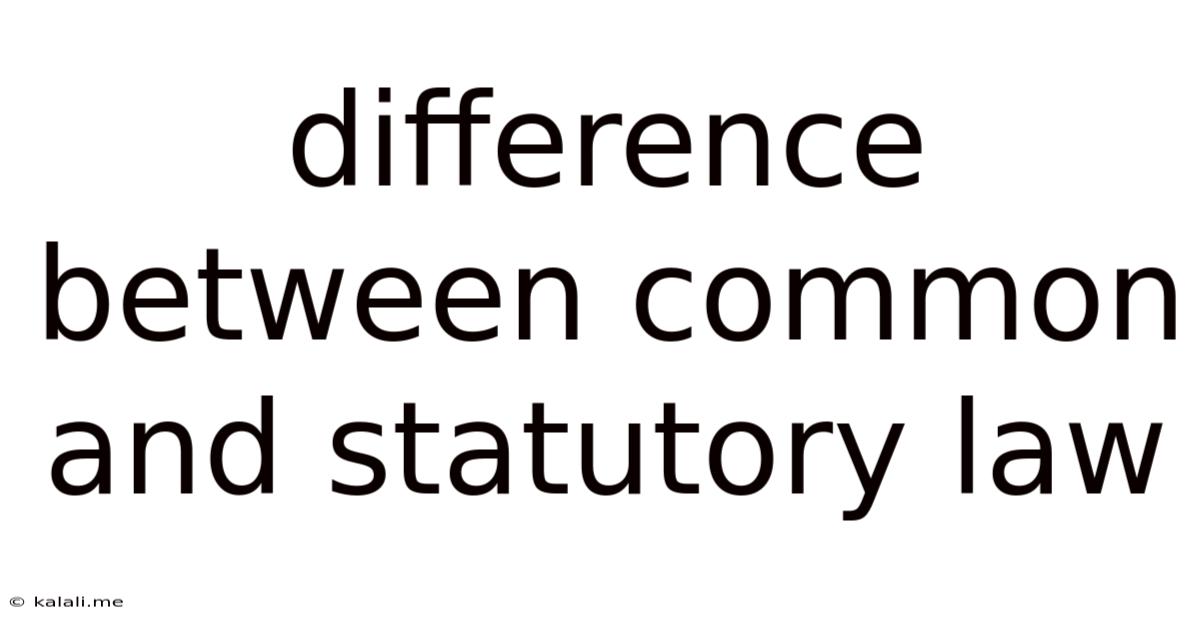Difference Between Common And Statutory Law
Kalali
Jun 11, 2025 · 3 min read

Table of Contents
Common Law vs. Statutory Law: Understanding the Key Differences
Understanding the difference between common law and statutory law is crucial for anyone interested in the legal system. These two distinct sources of law govern our lives, shaping everything from contract disputes to criminal prosecutions. This article will explore the core distinctions between these two powerful legal forces, shedding light on their origins, application, and impact on society. We will also touch upon the interplay between the two and how they coexist within a legal framework.
What is Common Law?
Common law, also known as case law or judge-made law, is a body of unwritten laws based on legal precedents established by the courts. It's a system built on the principle of stare decisis, Latin for "to stand by things decided." This means courts are bound by previous rulings on similar cases, creating a consistent and predictable application of the law. Judges interpret laws and apply them to specific situations, and their decisions become precedents that future courts must follow.
- Origins: Common law emerged in England centuries ago, evolving from customs and judicial decisions rather than formal legislation.
- Characteristics: It's flexible, adapting to changing societal norms through judicial interpretation, but this flexibility can also lead to inconsistencies across different jurisdictions.
- Examples: Many aspects of contract law, tort law (dealing with civil wrongs), and property law are rooted in common law.
What is Statutory Law?
Statutory law, on the other hand, is written law passed by a legislative body—such as a parliament, congress, or state legislature. These laws are codified, meaning they are formally written and published, providing a clear and accessible record of legal rules.
- Origins: Statutory law is deliberately created by lawmakers in response to perceived needs or problems within society.
- Characteristics: It provides a definitive statement of the law, offering greater certainty and predictability than common law. However, it can be rigid and may not adapt quickly to changing circumstances.
- Examples: Criminal law, tax law, and many aspects of corporate law are predominantly statutory.
Key Differences Summarized:
| Feature | Common Law | Statutory Law |
|---|---|---|
| Source | Judicial decisions, precedents | Legislative bodies (Parliament, Congress) |
| Form | Unwritten, based on precedent | Written, codified |
| Creation | Judges interpret existing laws & create precedents | Lawmakers create new laws |
| Flexibility | More flexible, adapts to changing times | Less flexible, requires amendment |
| Predictability | Less predictable initially; more predictable over time | More predictable |
| Enforcement | Through judicial interpretation and enforcement of precedents | Through government agencies and courts |
The Interplay Between Common and Statutory Law:
It's important to note that common and statutory law aren't mutually exclusive; they often interact and influence each other. Statutes can clarify or codify existing common law principles, while judicial interpretations of statutes can shape their application and create new precedents within the context of the written law. The relationship is dynamic, with both contributing to a comprehensive legal system. Courts frequently interpret statutory law, and these interpretations add to the body of case law, further illustrating their interwoven nature.
Conclusion:
Common law and statutory law are essential components of any developed legal system. Understanding their distinct characteristics and their interplay is crucial for comprehending how laws are made, interpreted, and applied. While statutory law provides clarity and predictability, common law offers flexibility and adaptability. Together, they form a robust framework for regulating society and resolving legal disputes. Both are indispensable tools in maintaining a just and equitable legal environment.
Latest Posts
Latest Posts
-
Mi Familia Fuera La M S Grande Correct Incorrect
Jul 01, 2025
-
How Much Is 20 Pounds Of Pennies Worth
Jul 01, 2025
-
How Much Does A Gallon Oil Weigh
Jul 01, 2025
-
How Many Crackers In A Sleeve Of Saltines
Jul 01, 2025
-
How Many Years Are In 48 Months
Jul 01, 2025
Related Post
Thank you for visiting our website which covers about Difference Between Common And Statutory Law . We hope the information provided has been useful to you. Feel free to contact us if you have any questions or need further assistance. See you next time and don't miss to bookmark.